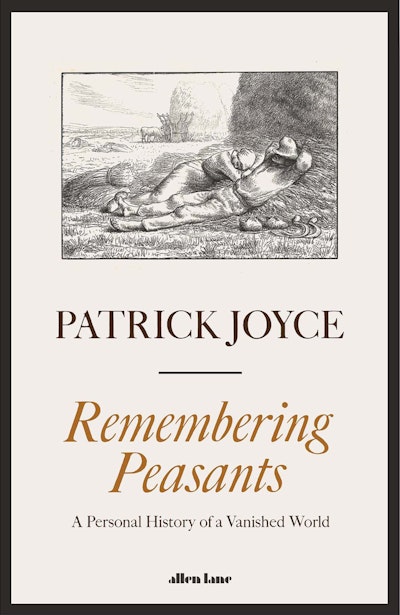- Published: 15 February 2024
- ISBN: 9780141998749
- Imprint: Penguin eBooks
- Format: EBook
- Pages: 400
Remembering Peasants
A Personal History of a Vanished World
- Published: 15 February 2024
- ISBN: 9780141998749
- Imprint: Penguin eBooks
- Format: EBook
- Pages: 400
A dozen pages in I realized that I had been waiting for much of my life to read this extraordinary book. Anyone who has ever tried to unravel the intertwined skeins of ancestry, sociology, music, geography and history will gape at Joyce’s skill. On almost every page the reader gets a jolt, a palpable sensation of immersion in the disappeared world of peasantry. A central part of the book is Joyce’s own family’s peasant past. I too, like many people, am only two generations and one language away from these ancestors. Because the time of the peasants is still palpable there are clues and messages here for every fortunate reader who picks up this book
Annie Proulx
A first-class work combining social history and ethnohistory with an unerring sense for a good story
Kirkus
Joyce’s study is an elegy for a way of life, … a moving and sensitive rumination…What gives Remembering Peasants its distinctiveness and its depth is the import of that word 'personal' in his subtitle. Its poignancy is intimate…Joyce is as much a necromancer, summoning the dead and bidding them speak, as he is a conventional historian… His beautifully written book is …haunted by the ghosts of the dead but also full of the warmth of human sympathy. Remembering Peasants is imbued with the diffuse and melancholy glow of a sinking sun
Fintan O’Toole, The New York Times
Books such as Remembering Peasants are landmarks and waymarkers... This is important, vital writing and study. The level of craftsmanship in the book is evident, but so too is its heart and soul. Reading it, I was changed and charged… Joyce is essential reading for anyone who cares about our shared past. A profound book
John Connell, The Irish Times
Remembering Peasants is a work of salvage and salvation, a great rescuing of Europe’s earth-toilers from historical neglect and erasure… a heart-writ valediction… Joyce is a propitious name for a writer of Irish heritage, but the author is more Heaney than Dubliners; his prose is peat-rich, dense with feeling as well as fact
John Lewis-Stempel, The Times
A fascinating new book... Joyce has performed a recuperative service on behalf of an often disdained culture – one that now has all but vanished in Europe. Joyce has set out to rectify the record for the lost peasant generations who, historically, 'do not generally speak, they are spoken to'
The Guardian
Joyce takes us to some of the places Europeans have established to remember peasants... But the most poignant of all are journeys to his ancestral home in Ireland’s far west… As its title indicates, Joyce’s lament is also a call to remember. Well written, expansive and often deeply moving, this is a fitting monument to Europe’s peasants
Luka Ivan Jukic, The Financial Times
Joyce writes with a split consciousness, like a man recounting his dreams. It was so real, this lost life, and yet it is impossible to recapture
Jeremy Harte, The Literary Review
Joyce rages against the amnesia hardwired into today’s 'all consuming' present... A loving and unconventional work of genealogy, and a melancholic elegy for bygone ways of being
Andrew Lynch, The Irish Independent
In this elegiac history, Joyce presents a painstaking account of a way of life to which, until recently, the vast majority of humanity was bound… The relative absence of peasants from the historical record, and the blinding speed with which they seem to have disappeared, prompt a moving final essay on the urgency of preserving our collective past
The New Yorker (Best Books of 2024)
Passionate, intelligent… heavyweight and compassionate
Unherd
It is really an ode, an elegiac lament for the passing of a distinctive way of life. But it is also something more personal, as the subtitle suggests: an act of veneration for the author’s own family
Jonathan Sumption, The Spectator
An insightful and evocative homage to the peasant way of life… Readers will be enthralled
Publishers Weekly (starred review)
Fascinating, elegiac... A lovely, scholarly, feeling (though never sentimental) account of glimpses and fragments, lifts a corner of the curtain on a world that will soon, to almost everyone, seem unimaginably strange and distant
Lucy Lethbridge, Prospect
The richness of this book… contains the seeds of more books, so numerous, deep and nuanced are the major themes uncovered
Fiona O'Connor, Morning Star
Joyce is the modern historian of uncharted lives and the landscapes of post-industry and post-agriculture. Like all the Joyces, he writes with extraordinary precision and grace
Colm Tóibín




